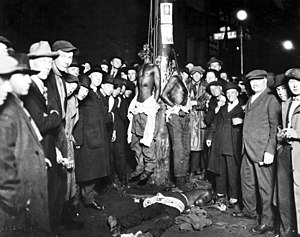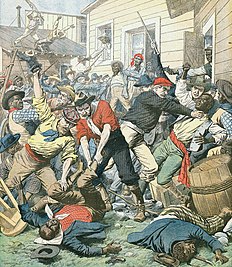
Back Lynchmorde von Duluth German Linchamientos de Duluth Spanish Lynchage de 1920 à Duluth French Linciaggio di Duluth del 1920 Italian Линчевание в Дулуте Russian Duluth lynchings SIMPLE Lynchningarna i Duluth 1920 Swedish
| Duluth lynchings | |
|---|---|
| Part of the Nadir of American race relations | |
 | |
| Location | Duluth, Minnesota |
| Target | Six arrested suspects |
| Victims | Elias Clayton, Elmer Jackson, and Isaac McGhie |
| Perpetrators | Mob (estimated 1,000 - 10,000 participants) |
| Motive | The alleged rape of Irene Tusken |
| Part of a series on the |
| Nadir of American race relations |
|---|
 |
On June 15, 1920, three African-American (Black) circus workers, Elias Clayton, Elmer Jackson, and Isaac McGhie, suspects in an assault case, were taken from the jail and lynched by a White mob of thousands in Duluth, Minnesota. Rumors had circulated that six Black men had raped and robbed a nineteen-year-old White woman. A physician who examined her found no physical evidence of rape.
The 1920 lynchings are the only known instance of lynching of African-Americans in Minnesota. Twenty other lynchings were recorded in Minnesota, and included mainly Native Americans and Whites.[1] Three men were convicted of rioting, but none served more than fifteen months. No one was ever prosecuted for the murders.
The state of Minnesota passed anti-lynching legislation in April 1921, and lynchings have not been recorded in Minnesota since.[1] In 2003, the city of Duluth erected a memorial to the lynched men.[2] In 2020, Max Mason, who was convicted in court after the lynchings, was granted the first posthumous pardon in the history of the state.[3]
- ^ a b Ziebarth, Marilyn (Summer 1996). "Judge Lynch in Minnesota" (PDF). Minnesota History. 55 (2): 72. Archived (PDF) from the original on May 10, 2022. Retrieved February 27, 2017.
- ^ Kraker, Dan (June 15, 2013). "Duluth marks anniversary of memorial to 3 lynching victims". www.mprnews.org. Archived from the original on March 1, 2016. Retrieved February 19, 2016.
- ^ Cite error: The named reference
onepardonedwas invoked but never defined (see the help page).
© MMXXIII Rich X Search. We shall prevail. All rights reserved. Rich X Search